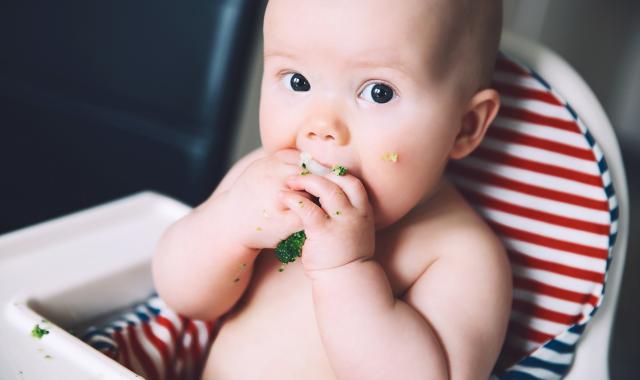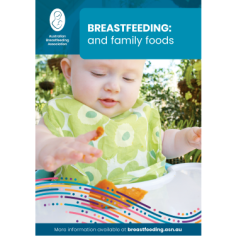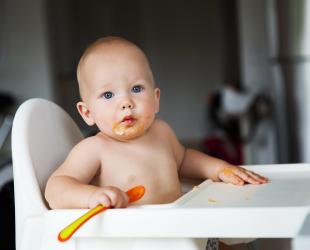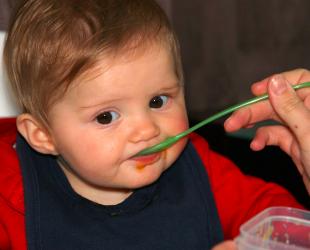Finding the right balance between breastmilk and solids is key in your baby’s first year.

Starting solids is about helping your baby learn and explore new foods, while breastmilk remains their main source of nutrition for the first year.
Here’s how to balance breastfeeds and solids, and what to expect as your baby grows.
Breastmilk comes first
- Breastmilk is your baby’s most important food until 12 months.
- You can offer breastfeeds whenever your baby wants. They don’t have to be tied to mealtimes.
- If you offer the breast before solids, you can be sure your baby is getting their most important food first, and you can relax about them trying new foods.
- If your baby falls asleep after breastfeeding, you can offer solids when they next wake. Or you can breastfeed between family meals.
- After 12 months, breastmilk can still be part of your toddler’s diet, but they’ll start eating more family foods.
Solids: learning, not replacing
- Starting solids is about tasting and learning to handle food, not satisfying hunger.
- Solids are an add-on to breastmilk, not a replacement.
- At first, one small 'meal' of solid food each day is enough.
- You can offer solids at any time that suits you and your baby. Family mealtimes are ideal.
How much food does my baby need?
- Begin with very small amounts – just a taste or a teaspoon.
- Many babies won’t eat much until about 7 months.
- Gradually build up to three meals a day (plus drinks and snacks) over the next 6 months.
General guide for babies aged 7–12 months
Here’s a brief summary of daily amounts for how much babies should eat from the different food groups each day. It’s based on the Australian Dietary Guidelines. Every baby is different. Some need a little more, some a little less and amount may vary from day to day.
- Meats, poultry, fish, eggs, legumes: 30g per day (e.g. 1 to 2 tablespoons cooked meat or 1 egg or 1/2 cup cooked beans). Focus on the good sources of iron first.
- Grain foods: 60g per day (e.g. 1½ slices bread or 3/4 cup cooked pasta)
- Vegetables: 30–40g per day (e.g. 1/4 cup cooked veggies)
- Fruit: 10g per day (e.g. 1/8 medium piece of fruit such as apple or banana)
- Dairy foods: Small amounts, like 1/2 tablespoon yoghurt or 5g cheese
- Fats and oils: Small amounts, like 1 tablespoon avocado or up to 1 tablespoon nut paste
What if my baby isn’t interested in solids?
Some babies are keen eaters, while others just want to play with their food. In the first 12 months, breastmilk is still your baby’s main source of nutrition and solids. Keep offering small amounts of whatever the family is eating but don’t worry if they aren’t taking much. Focus on nutrient-dense foods, especially iron-rich options, aiming for quality, rather than quantity.
If you’re concerned, try offering solids when your baby is hungriest, then follow up with a breastfeed. Most importantly, mealtimes should be relaxed and pressure-free.
Breastfeeds and solids for toddlers
As your child grows, they’ll start eating more of the foods your family enjoys. There’s no need for special 'toddler foods'. Simple family meals, adapted as needed, are usually best. Many toddlers are naturally picky eaters, and their appetite can change from day to day. Even when toddlers aren’t eating much food, breastfeeds can still be a comforting and nutritious part of their diet. Every child is different and breastmilk can continue to be part of their diet as they grow.
About toddler milks
'Toddler' or 'growing-up' milks marketed for children over 12 months don’t help children learn to eat normal foods. These products don’t provide extra benefits over family foods and aren’t recommended by health experts. For most children, a variety of family foods, together with breastmilk if you’re still breastfeeding, provide all the nutrition they need as they grow.
© Australian Breastfeeding Association December 2025
Read more about introducing solids
Evidence-led info and practical tips from our Breastfeeding Information Series
Breastfeeding: and family foods



